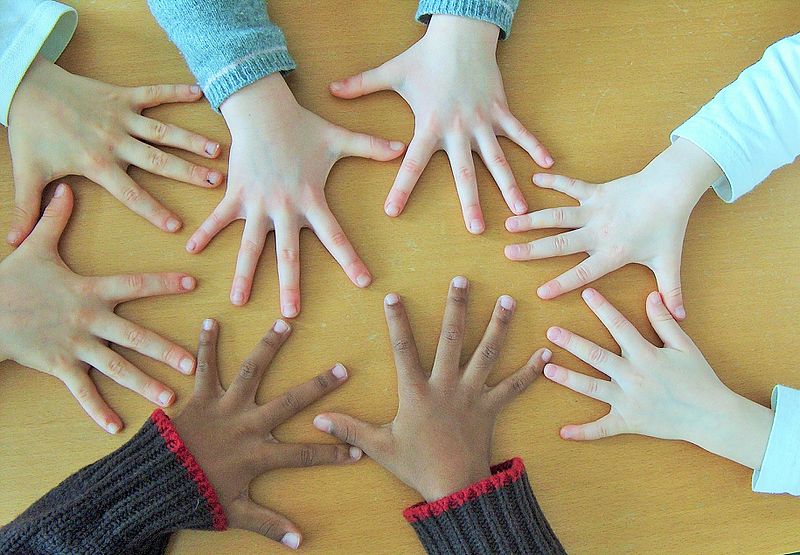(前編を読む)
2 福音が外へと動かす
[toggle]Second, the gospel moves us out. [/toggle]福音は初期の弟子たちを、自分たちの文化の外へと導き、彼らは自分たちとは違う人々に向けて話をし、共に暮らすようになった。ペンテコステの時にいた人は皆、ユダヤ人だった。しかし彼らの語る福音は、ローマ帝国内のさまざまな言語を話すコミュニティーへと伝わった。その福音が最初にしたことは、キリストの主権のもとで人々を一つにすることだった。
[toggle]The gospel drew the early disciples outside of their own culture to speak and do life with people who were very different from themselves. Everyone at Pentecost was Jewish, but that Judaism had been moved into the varied languages and communities of the Roman Empire. The first thing that the gospel did was to bring people together under the lordship of Christ. [/toggle]もし福音が、力強い神のみわざについて聞くための共有の場に私たちを引き寄せたのなら、なぜいま私たちは一緒にいないのか。霊的にも実践的にもクリスチャンが一致するのを世界が見ることになれば、それはどのような意味を持つのか。
[toggle]If the gospel draws us into a shared space to hear the mighty works of God, why aren’t we together anymore? And what would it mean for the watching world to see a Christianity that is actually together, spiritually and practically? [/toggle]
(写真:Ibex73)
黒人のクリスチャンは、自分たちを支持する理由のない人とも上手くやっていける。そのへんの人種差別主義者にも対応できる。しかし、彼らの心を痛めさせ、疲れさせることは何かというと、自分たちが存在する権利のために戦っている中で、敵が自分の兄弟姉妹だったと知ることだ。
[toggle]Black Christians can deal with people who have no reason support us. We can deal with secular racists. What is heartbreaking and exhausting is to find ourselves fighting for our right to exist and then find that the enemy is our brother. As the Psalms say, “It is not enemies who taunt me—I could bear that; but it is you, my equal, my companion, my familiar friend, with whom I kept pleasant company; we walked in the house of God” (Ps. 55:12–14, NRSV). [/toggle]私を嘲(あざけ)るのは敵ではない。そうであるなら耐えられる。尊大に振る舞うのは私を憎む者ではない。そうであれば彼から隠れられる。だが、それはあなたなのだ。私と同等の立場の者、友、心を許した人。一緒に親しく交わり、神の家を群衆と共に歩いたではないか。(詩編55:13~15)
私たちが一緒にいるのなら、私たちの共に生きる生活とは、自らの自由を犠牲にすることではない。その自由を手に入れるために、兄弟姉妹と戦う必要はない。
[toggle]Our life together, if we are to be together, can’t come at the expense of our freedom. We shouldn’t have to fight our brothers and sisters to obtain it. [/toggle]ここでまたペンテコステの話から学ぶべきことがある。さまざまな国民が一緒に集まる中で二つの反応があった。「あの人たちは新しいぶどう酒に酔っているのだ」(使徒2:13)と嘲る者と、「一体、これはどういうことなのか」(同12節)と尋ねる者。何が起こっているのか認識することを拒否し、自分の知っている経験を持ち出して、神の働きを無視する者と、「このただ中で神は何をしておられるのか」と、より深い疑問を持つ者。
[toggle]Here again, the story of Pentecost provides insight. As the nations are being drawn together, there are two responses: One group says in so many words, “They are just drunk” (Acts 2:13). The other asks, “What does this mean?” (Acts 2:12). One group refuses to acknowledge what is going on and draws upon their known experience to dismiss the work of God. The other asks a deeper question: What is God up to in their midst? [/toggle]ペトロは最初のグループに短い言葉でまず語ったが、その後、もっと時間をかけてその意味について取り組んだ。彼は群衆に向かって、旧約聖書のヨエル書3章1~5節で約束されている霊を体験したのだと教えた(使徒2:16~21)。神がその民を贖(あがな)うとき、男も女も、老いも若きも、金持ちも貧乏人もないと預言者ヨエルは宣言した。世界共通の聖霊の賜物(たまもの)は、福音が持つ世界共通の救いの力の証しなのだと、ペトロは初代教会に対して再認識させたかったのだ。
[toggle]Peter addresses the first group with a sentence or two but takes more time to address the question of meaning. He tells the crowd that they are experiencing the Spirit promised in Joel 2:28–32. The prophet Joel claims that when God redeems his people, he will redeem men and women, young and old, rich and poor. Peter wants to remind the early church that the universal gift of the Spirit is a testimony to the universal saving power of the gospel. [/toggle]言い換えれば、女と男、金持ちと貧乏人が共に力強い神を宣言したペンテコステのあり方は、ペンテコステの神学である「福音はすべての人のためにある」という考え方を支持する。
[toggle]In other words, the form of Pentecost—women, men, rich, and poor declaring the mighty works of God—supports the theology of Pentecost—the idea that the gospel is for everyone. [/toggle]初代教会でそれは真実だった。そして、21世紀の米国内の教会でも真実だ。
[toggle]That held true for the early church. It also holds true for the American church of the 21st century. [/toggle]今日、ある人は、黒人の正義に対する要求を見て、政治的な説明しかできない。そういう批評家は、「彼らはただ教会をダメにしようとしている民主党員だ」と言うか、「彼らは神学的にリベラルで、マルクス主義にかぶれている」と言うだけだ。しかし、それによって問題自体から目をそらそうとしているのかもしれない。
黒人、ラテン系、アジア系の兄弟姉妹が正義のために声を上げるとき、本当は何を伝えようとしているのか。それはどういう意味なのか。そして、神はそこにどう関わってくるのか。神はさまざまな人種を一つにまとめ、聖霊の力によって新しい福音的な場所へと私たちを導いてくださる。
[toggle]Today, some people look at the black demands for justice and can only reach for a political explanation. These critics respond by saying, “They are just Democrats trying to ruin the church,” or “They are really theological liberals beholden to Marxism.” But maybe those are ways to avoid looking at the thing itself. What are black, Latino, and Asian brothers and sisters really saying when they call for justice? What does it mean? And what is God up to? He is drawing diverse people together and then moving us into new gospel spaces by the power of the Holy Spirit. [/toggle]3 福音はこれから来る王国の希望を与える
[toggle]Third, the gospel gives us hope in the coming kingdom. [/toggle]この国の希望が選挙や政党によってもたらされるわけではないと私は確信している。投票には意味があるが、民主党だろうが共和党だろうが、どちらも私たちを救うことはできない。私たちに必要なのは、霊に満たされた教会、違いのある人を一つにまとめる懐の広い教会だ。
[toggle]I am convinced that the hope for this country is found not in any election or political party. Votes matter, but neither the Democratic party nor the Republican party will save us. What we need is a Spirit-filled Christianity big enough to draw different people together. [/toggle]この一致のためには二つのことが必要だ。まず私たちは、問題が「外」にあると考えてはいけない。それは私たちの心の中にある。問題は、この世にある人種差別だけではない。問題は、神が持っておられる自分のための計画に私たち全員が反抗して生きているということだ。福音は私たちに、自分の罪について決断するよう迫る。イエスが繰り返し伝えたメッセージは、「悔い改めよ。天の国は近づいた」(マタイ4:17)だ。
[toggle]This unity involves two things. First, we have to recognize that the problem is not just “out there.” It’s in our hearts. The problem isn’t just that racists exist in the world. The problem is that we all in various ways live in rebellion against God and his will for us. The gospel demands a decision from each of us about our own sins. One of Jesus’s oft-repeated messages was, “Repent, for the kingdom of heaven is at hand” (Matt. 4:17). [/toggle]イエスは私たちに、自分の罪を悔い改めるようにと呼びかける。なぜか。それこそが二つ目のポイントで、神の御国が近いからだ。この御国について、イエスの最初の説教でも描かれているが、貧しい人、捕らわれている人に解放を告げるためにイエスは福音を宣言する(ルカ4:16~21)。
イエスは罪人を救うために来たが、救われた罪人は今、神の御国のビジョンを持って生きる証しなのだ。キリストが復活したからこそ、この御国が来ることを私たちは知っている。ペトロはこう説明する。「あなたがたが十字架につけたこのイエスを、神は主とし、またメシアとなさったのです」(使徒2:36)
[toggle]He calls us to repent personally for our sins. Why? Because—and here’s the second point—the kingdom of God is coming. This kingdom is depicted in Jesus’ first sermon, in which he proclaimed good news to the poor and liberty to the captives (Luke 4:16–21). Jesus came to save sinners, but those saved sinners now bear witness in their lives to God’s kingdom vision. We know that this kingdom is coming because Christ is risen. Peter says it this way: “God has made this Jesus, whom you crucified, both Lord and Messiah” (Acts 2:36). [/toggle]未来を握るのは誰か。誰が目的をもって歴史をつづるのか。獅子であり小羊であられるその方しかいない(黙示5:5~6)。正義とあわれみを同時に体現するその方しか。
[toggle]Who controls the future? Who unfurls history according to his purpose? The one who is the Lion and the Lamb at the same time (Rev. 5:5–6). The one who embodies both justice and mercy. [/toggle]私たち米国の教会は、火のついたこの国とこの世に伝えるべきことがある。あなたを愛する神がおられ、あなたにそれを知ってもらうために死なれたお方がいる。たとえ政治家や哲学者が失敗したとしても、この愛は、この世界で分断された人々をまとめることができる。この世には正義の神がおられ、ジョージ・フロイドのような、この世で悩める人々の行動を見つめておられる。神が王として治める王国がある。そして、この世界の果てまでもその存在が知られるようにと、神はご自分の霊を与えたのだ。
[toggle]We the American church have a message for a country and a world on fire: There is a God who loves you and died that you might know him. This love is sufficient to gather the divided peoples of the world, even when all the politicians and philosophers fail. There is a God of justice who sees and acts on behalf of the beleaguered peoples of the world, people like George Floyd. There is a king and kingdom. And he has given us his Spirit to make him known to the ends of the earth. [/toggle]執筆者のエサウ・マッカウリーは北米聖公会教会牧師、ホイートン大学での新約聖書担当教授。著書『黒人として読む──希望をもって行動するためのアフリカン・アメリカン流聖書解釈』が近日発売予定。
この記事は5月31日、ノースカロライナ州グリーンズボロの聖公会教会での説教からの抜粋。
本記事は「クリスチャニティー・トゥデイ」(米国)より翻訳、転載しました。翻訳にあたって、多少の省略をしています。
